#and now that has led to several minor plot changes that affects the entire story 😭
Explore tagged Tumblr posts
Note
I love how you answer asks like you aren't the creator, we really are all just going with the flow huh😭
LMAOOO i mean in all honesty i am going with the flow too 😭 i do not or control its trajectory at all, i just write up wherever it takes me 🙏🏻
#asks with naoya's trophy wife#series: dusk till dawn#the amount of scenes i’ve deleted or changed on the spot bcos it did not feel right while writing it EVEN if i’ve thought about that scene#FOR DAYS OR WEEKS#like sometimes the plans i have in my mind alr marinated but when it gets to the doc and it feels weird? an immediate goodbye#and now that has led to several minor plot changes that affects the entire story 😭#i think once dtd is done i might share all the alt endings + deleted scenes that we could have had if you guys want that!
10 notes
·
View notes
Text
Enola Holmes in Review
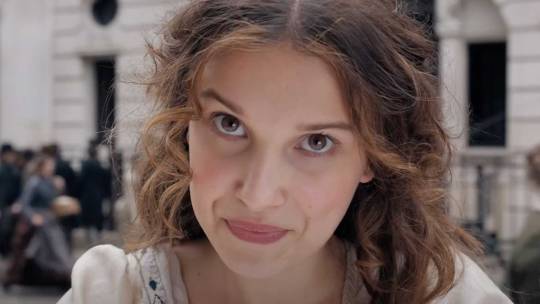
Gentle Readers:
1. I did not plan to watch Enola Holmes
2. I do not/have not watched Stranger Things, and my entire concept of Millie Bobby Brown as a human is encapsulated in the occasional errant tumblr post, and a line of eyewear she apparently has created, posters for which hang at my glasses-provider.
3. I had never heard of the YA novels about Enola Holmes

There she is!
Yes, I do tend to enjoy nearly any incarnation of Sherlock Holmes. And, yes, I am often surprised by this fact. For some reason, Holmes, unlike, say, Chris Evans as Cap or Chris Hemsworth as Thor [instances where I can’t really imagine enjoying anyone else in the role] I am always interested to see someone else’s [writer and actor and director]’s take on him. *Subtle shout-out to James D’Arcy’s 2002 turn in A Case of Evil.
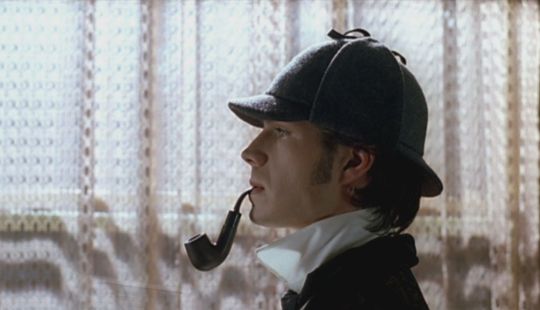
Mr. Jarvis! [and there was Vincent D’Onofrio and opium!!]
And yet, watching the Enola Holmes trailer [no doubt b/c of tumblr], and yes, admittedly not unmoved [we are not made of stone] by Cavill’s Curls™ the delight I felt in watching that advert led me to start informing my family that on September 23rd what I was going to be doing was enjoying Enola Holmes on Netflix [and anyone else was free to join me].
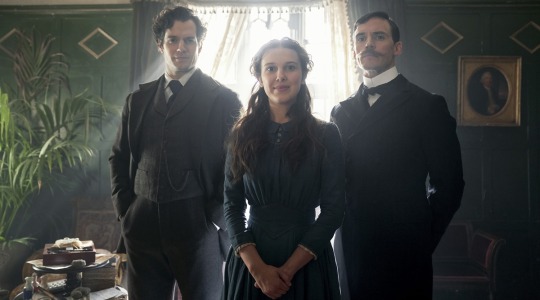
Someone important is missing from this picture
And what a delight it was. In the run-up to its debut I read more than a few reviews of the film [and, I think, every one of them written by men], some of which struck me as simply coming from a place of mean-spiritedness, yet none—even the positive reviews—preparing me for how ENJOYABLE this film is.
I’m not going to provide a full review point-by-point here, b/c the film involves cases to be solved (no, none of them are overwhelmingly complex—YA novel--, so all the more reason not to spoil any pay-offs). But I do have some things to talk about.
THE ELEPHANT IN THE ROOM – And what a nice, nice elephant it is! Henry Cavill as Holmes is, in my opinion an absolute delight of a performance. From the moment he first says Enola’s name (a perfectly-rendered reaction to the moment playing out) this Holmes fits into this Greatest Showman-like version of Victorian England, where no one’s too dirty no matter how poor, and where despite a flaming red dress, cut too low for daytime wear, young Enola is never once mistaken for a working girl. [Again, YA novel] As other reviewers have noted, HC is, well, Cut and Bulked Out, and in his highly tailored frock coats well, strapping is too light a description word. *not a complaint. Cavill’s Curls are out and proud and here to tell us that we are meant to be Having Fun, and Gentle Readers—THEY DO NOT LIE.
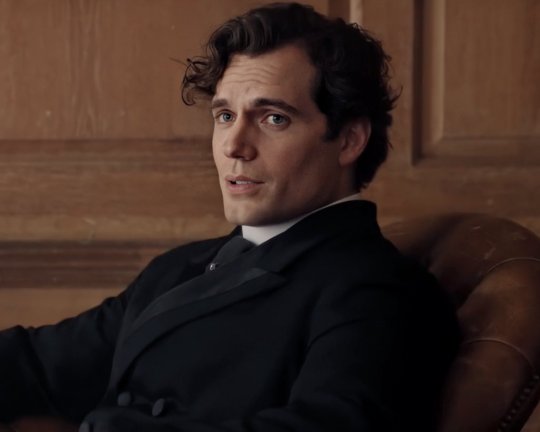
No, not a priest’s collar where he is undercover (though I had thought so)
In fact, you could absolutely write your thesis statement on this film, that it’s really a fraternal, familial love story between Sherlock and Enola. Sherlock is the character during the two hours that actually changes. [Yes, Enola comes to an understanding about herself, and her circumstances change repeatedly—but it is Sherlock who experiences a Change of Heart/Reversal].
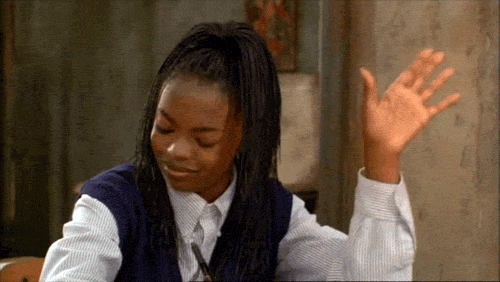
Raise your hand if you’re totally here for significantly older brother/significantly youngest sister family love!
HOW I WOULD DESCRIBE IT – This might in no way be helpful, but, Enola Holmes is basically The Young Indiana Jones Chronicles...
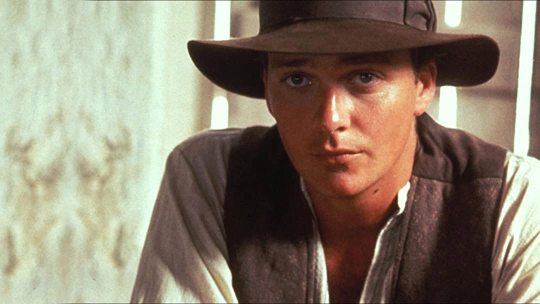
Where have you gone, Sean Patrick Flanery?
a YA historical storyline that’s written adjacent to [there, famous people] here, enduring fictional characters. It’s adventurous and pleasantly immersive, historical morays are given a slap-dash portrayal, rather than a fully-accurate representation, there’s adventures to be had, and side-characters to be converted into caring about the title character as much as we, the audience, do.
LUCY HONEYCHURCH – Yes, that gorgeous girl from Windy Corner. The timeline doesn’t jibe, but I daresay Helena Bonham Carter (back in a corset—though she may have worn those for Bellatrix) as Eudoria Holmes *IS* what Lucy Honeychurch might well have become beyond A Room with a View’s end. Bonham Carter looks absolutely at home here (period films have sorely missed her! –she had a part in 2015’s Suffragette), and still wears the trappings of Victorian England like a second skin.
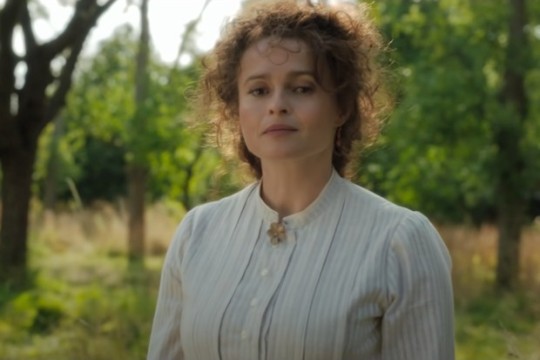
Not to mention that she now join my personal comfort-list of on-screen mothers with the likes of 1997’s Little Women Susan Sarandon and Cinderella’s Hayley Atwell.
FAMILY ISSUES OR PLOT HOLES?
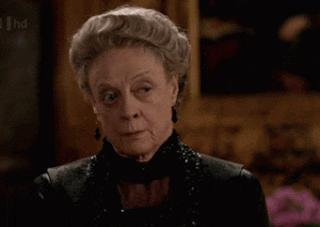
It’s a fair question. There’s a lot going on in this plot, some of which...seem solvable. Why has it been so very long since the Holmes brothers have seen their own mother? And sister? How could the woman we come to know as Eudoria raise a Mycroft? [see also, Molly Weasley?] Why aren’t people who seem to care about Enola more engaged with saving her from all the dangers London throws in her way? Why does Enola accept several acts of violence aimed at her, why does she in certain instances Do What She Is Told? Rather than chalk these up to plot holes or convenient devices, I’m siding with the Holmes family being dysfunctional [who knows what dad was like? We’re certainly not told here].
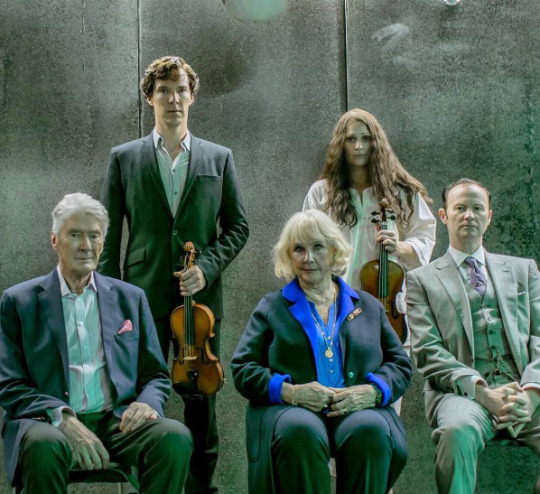
[clears throat]
The conversations between Mycroft and Sherlock barely skim the surface of any subject they interact on. Classic dysfunction: distancing one’s true self from human interaction b/c keeping the peace supersedes all else.
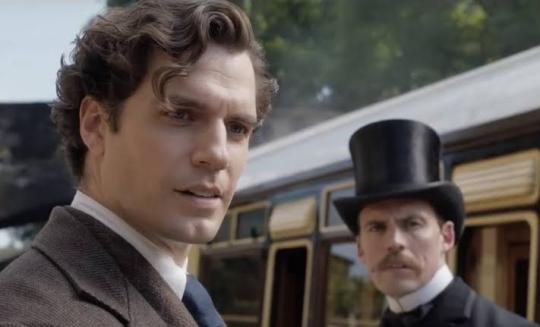
Enola accepts certain treatments b/c if we really do watch her relationship with her mother, there is an element of something amiss—as I will declare the later abandonment shows. Enola is a child used to being elevated and celebrated on one hand, and shut out and isolated on the other. Her parent has informed her about so much, but essentially locked her away in a false reality, where Enola is not taken to see the world, nor taught how to interact in it (which is explicitly stated). Perhaps it is not so surprising that the Holmes’ brothers have not cared overly much for visiting their remaining family. And when repeatedly confronted with a minor child (and yet a child likely though old enough or about so, to be married off) being forced to endure things diametrically opposed to her will—the brothers’ reactions are stoic, the system they accept as to how life must be lived immoveable and morally right simply by its very existence.
MILLIE BOBBY BROWN – THE STAR – In what has to be an Emmy-nomination-deserving turn, MBB is nothing short of wholly in charge of the screen. She never overpowers the story. She’s as loveable as Sandra Bullock in While You Were Sleeping, and as ready for her closeup as Jennifer Lawrence in The Hunger Games. As another review mentioned, she handles the 4th wall breaks in such as way as we look forward to the next time she’s going to talk to us. We ache with her sorrow for her lost mom, and rage with her at the adults in her life choosing wrongly for her future—or simply not choosing at all.
A random observation, but one that feels important to me: her HAIR. Yes! They’ve managed to make a late Victorian-era film where the heroine’s hair looks like real hair that someone really styled (or in some scenes, didn’t). And yet, where the hair looks proper for the time. [wild applause]
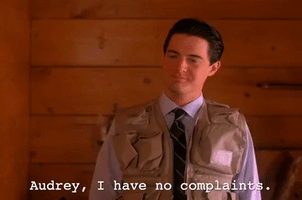
COMPLAINTS: Well, in honesty there aren’t any. If you want to complain that there isn’t any dirt, that the evil of the world (I mean, c’mon, this is narrowly post-Dickensian London, here) is neutered, that the adults in question seem neither alarmed enough or emboldened enough at either their mother or sister being missing and possibly out of their depths in a dangerous society without protection, and in Enola’s case real-world skills--? Well, I’m certainly not going to disagree with you. This is YA Victorian London, after all, not Ripper Street. There is also neither a hint of or actual threat of sexual violence at any point in the film. But the lack of that has preserved us from having to sit through that, as well as no doubt lectures about how Enola’s virtue might be spoilt and she might become useful to no man.
The relationships are appropriate, too. Despite strides between Enola and certain adults in the film, by the time the credits roll they’re not showing physical affection toward each other (a move that would have seemed over-the-top), and teen relationships are shown progressing at a reasonable and mutedly awkward pace.
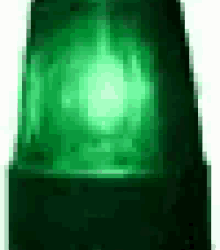
Now, Netflix, green-light me five more films (or more). There’s still a new version of John Watson to meet, after all!
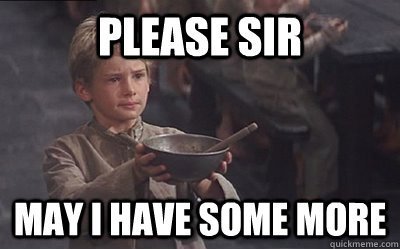
#enola holmes#netflix enola holmes#millie bobby brown#henry cavill#helena bonham carter#SUCH A GOOD TIME!#universally well-liked!
162 notes
·
View notes
Text
Wish List: Final Fantasy VII Remake
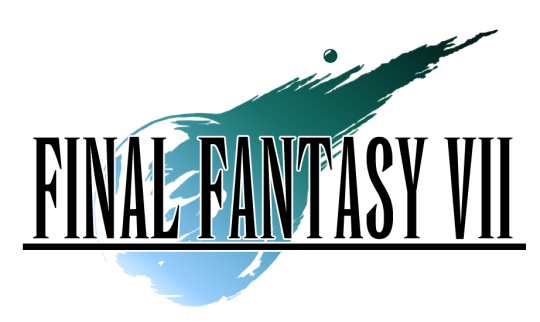
Rumors flying around suggest the first part of the FFVII Remake could see release in 2019 or 2020. This means it will be nearly 25 years on before we see it, and much to the chagrin of the truly obsessive sects of the original game’s fanbase, it is going to be a very different experience than the original was. Most people, however, seem to have embraced this necessity, and are ready for a fresh look at the world of FFVII.
As such, I decided to explore the things I think would be of most benefit to upgrade, alter or just plain change in the remake. This is strictly a list of good things I want, and that which you should want to since I am obviously always right. I didn’t include any “Don’t do this”s, because you can go to any forum if you want a long list of demands of what not to do.
WARNING: This post includes minor SPOILERS for Final Fantasy VII.
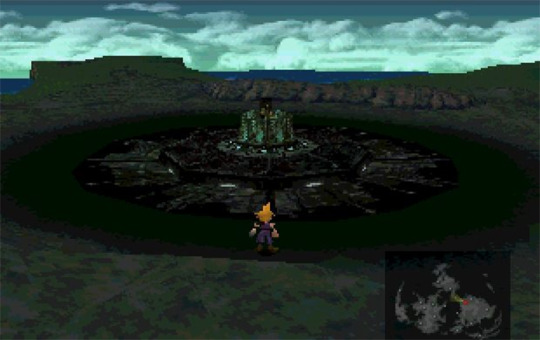
A More Thorough Open World
FFXV made strides toward taking the series off the linear path it has always been on, which was wise, seeing as FFXIII was roundly criticized even by supporters for being basically a straight-ahead path through the entire story. However, Square’s lack of experience with the genre was evident. Players were heavily limited as to where they could go at any one point, side quests were rarely engaging (though still a step up from XIII), and traversal was much more of a chore than it needed to be.
With clear dystopian inspirations ranging from Metropolis to Blade Runner mixed with more traditional fantasy settings, FFVII has always had one of the more intriguing worlds in a series where world-building was never a core tenet. The times being what they are, a remake will have to be less linear, and if Square is going to do it they should do it up right. The nature of the story means that you can’t just drop us in and let us go wherever we want immediately, but Square can work within the boundaries of the story to make the world feel more alive by modern standards. For instance, although being confined to Midgar for the first several hours is essential to the atmosphere the game sets, it would be great if we could opt to explore the entire city, rather than just the designated sectors. Once you’re out in the world, it would be a simple matter to make all the towns and “dungeons” accessible from the get-go, while simply holding the story beats over for when you’ve progressed that far.
Camaraderie
Some things in FFXV worked and some did not, but by far the best and most well-implemented idea the game had was the way your main party interacts with each other. FFVII has one of the most iconic casts in video games, but due to technical limitations, they never interacted outside of scripted scenes or FMVs. The remake should have everyone in your current party visible at all times, traversing the world with you, talking to each other, pointing out interesting or dangerous things in the environment, etc. Each character having something non-battle-related they were good at, like cooking or fishing, was one of the more popular aspects of XV and should be repeated in VII…and not just because I want to see Cloud burn the toast. Unlike XV, however, you should be able to take direct control of any party member at any time, because fans have waited a long time for this, and will want to step into everyone’s shoes directly. Make it feel like everyone is fully present, all the time, and not simply waiting for the plot to get around to them.
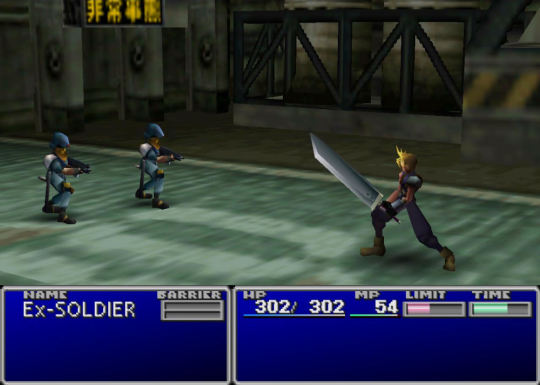
Change the Skill System
That’s right; I’m going there. The Materia system was a step forward for the genre at the time it released, but it is now in need of a serious overhaul, especially if the game goes the modern action-RPG direction it appears to be heading. Making each player unique in battle, rather than a mostly-interchangeable vessel for skills loaned from an item, is going to be essential, since most of us will want the different fighting styles of the characters to be highlighted in actual gameplay. The easiest way for this to happen is to move the limit break system to a tiered special skill set, similar to what the characters in FFXV used. Cloud’s Braver, for instance, is no longer visually impressive, and should probably be a standard skill he can activate and then recharge.
As for the Materia itself, some of the skills it imparted just won’t be useful in an action battle system, while some such as Toad won’t be feasible to recreate in a 3D engine. Streamline the existing spell and skill list, while adding a few nifty new ones for good measure. Tie the performance of different kinds of magic to a character’s aptitude and make them able to get better at it with use, which still lets anyone equip anything while encouraging unique styles for each character. And for Ramuh’s sake, make the summons cool again. Hell, make them like FFXII, temporarily able to replace your entire active party except for the summoner. That would be boss and stuff.
Make the Side Content Matter
Prior to FFXII, side content in the series was robust and complex, and while it could sometimes be more trouble than it was worth (I don’t know about you, but I don’t care if I catch all those butterflies), it was at least unique from what you spent the rest of the game doing. Stuff like Triple Triad and Chocobo Hot and Cold were both fun, and offered substantial rewards for sticking to them. Then it got replaced by “Go here, kill this monster, come back, get some gold and an item you don’t need.” It has been more or less that ever since. If we’re going back to FFVII, let’s go back as well to a time when heading off the beaten path not only led to discovering entirely optional parts of the world, but the pay off for that exploration felt worth it.
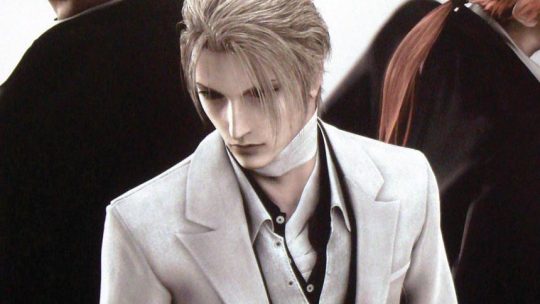
Make the Sub-Villains more Complex
Any hint of messing with FFVII’s pristine pinnacle of storytelling gets met with backlash from certain fans, but here’s the thing: as good as it is, it isn’t actually perfect. Notably, most every secondary villain, primarily the heads of the ShinRa corporation, are about as developed as a man in a black hat tying a woman to the train tracks. They’re cartoons, and all the depth in the secondary villain category comes from the Turks. If the game is going to work in the modern day and maintain the gritty, morally ambiguous world it originally affected, folks like Rufus, Scarlet and Heidegger are going to need to be more than cackling baddies. In fact, it couldn’t hurt to re-write most of their characters from the feet up.
Have the Story Make Sense
Again, FFVII’s story had more flaws than fans want to admit. Chief among these was an atrocious translation that will almost certainly not be an issue once the script is overhauled to work in a modern game, but it’s also true that without outside assistance, it was very, very hard to follow parts of the convoluted story, especially as it related to Cloud and Sephiroth. It seems clear from both the direction the game is taking and the reaction that it is built to appeal to those who never played the original, and making sure they aren’t scratching their heads trying to figure out what the hell old Sephie is talking about would go a long way towards that.
Make Vincent and Yuffie Essential
This one is pretty straight forward. Vincent, especially, actually has a huge role in the overall lore of FFVII, and having him be optional didn’t make a lot of sense to begin with. Plus, does anyone really want to do that stupid safe-cracking minigame again? If you do, I question the state of your sanity.
#final fantasy vii#video games#JRPG#rpg#cloud strife#square enix#metropolis#Blade Runner#Magic#final fantasy xiii#final fantasy xii#final fantasy x
2 notes
·
View notes
Text
“MARSHALL” (2017) Review

"MARSHALL" (2017) Review I have a confession. I had no interest in seeing the recent movie, "MARSHALL", when I first heard about it. I thought it would turn out to be one of those solemn biography flicks about some "great man in history" and his struggles to become successful in his endeavors. But when I learned about the movie's plot, I changed my mind and decided to see it.
Directed by Reginald Hudlin, "MARSHALL" was about a "great man in history" - none other than the first African-American to be an Associate Justice of the U.S. Supreme Court, Thurgood Marshall. However, this film focused on his position as a defense counselor for and director of NAACP Legal Defense and Educational Fund and his role in the 1941 case of "the State of Connecticut v. Joseph Spell". Following the successful end of a case in Oklahoma in 1941, NAACP defense attorney Thurgood Marshall returns to New York City for a rest. However, his rest and reunion with his wife, Vivien "Buster" Burey, is short-lived when NAACP Director Walter Francis White sends him to Bridgeport, Connecticut to defend Joseph Spell, a chauffeur accused of rape by his white employer, Eleanor Strubing. In order to get Marshall admitted to the local bar and defend Spell, a local member of the Bridgeport NAACP office tries to recruit an insurance attorney named Sam Friedman to help. However, Friedman is more interested in keeping his distance from the controversial case, until his brother Irwin coerces him into getting involved. Judge Foster a family friend of prosecutor Lorin Willis, agrees to admit Marshall to the local bar. But he forbids Marshall from speaking during the trial. This act forces Friedman to act as Spell's lead counsel, while Marshall guides the former through the jury selection process and the actual trial. Judge Foster's refusal to allow Marshall to speak proves to be the first of several stumbling blocks in his and Friedman's efforts to defend Spell. Despite the movie's narrative, "MARSHALL" could have remained one of those stately biopics that usually ends up boring me senseless. Thanks to Reginald Hudlin's direction and the screenplay written by Michael and Jacob Koskoff, the movie proved to be a lot different. Instead, "MARSHALL" proved to be a very interesting re-creation of the 1941 controversial case in which a black man is accused of raping a white woman. Stories or real life incidents involving interracial rape - especially that of white women - have been around for decades. Stories about racism in the U.S. South have been around for a long time, as well. However, I have also noticed that in recent years, Hollywood has turned its eye upon Northern racism, especially in the Northeast. In its portrayal of the "the State of Connecticut v. Joseph Spell" case, "MARSHALL"turned out to be one of those movies that exposed Northern racism. I was also impressed by how the Koskoff brothers treated the Spell case as a legal mystery. Ironically, the movie did not begin with scenes that led to Joseph Spell's arrest. I must admit that I had expected "MARSHALL" to begin with a sequence featuring vague details of the crime. Instead, it began with Thurgood Marshall finishing a case in Oklahoma. The audience learned about the Spell case around the same time Walter White assigned him to defend Joseph Spell. This led me to realize that the entire movie was told from the viewpoint of two people - Marshall and Sam Friedman. Some have criticized the movie for including Friedman as a leading character in the film. They believed this situation robbed the Thurgood Marshall character some of his agency as the film's leading character, by having Friedman as a co-lead. Personally, I did not mind occasionally watching the film from Friedman's point-of-view. I found it interesting. And to be honest, history itself set up this situation, due to the trial's presiding judge refusing to recognize Marshall as Spell's primary attorney. However, dealing with a potentially hostile judge and a patronizing prosecutor, and being regulated to secondary attorney for the defense seemed to be a walk in the park for Marshall. He also has to deal with Bridgeport's racially hostile citizens; pressure from the N.A.A.C.P. to successfully defend Spell; and Friedman, who turned out to be a reluctant and wary co-defender, worried about how his defense of Spell would affect his practice. Marshall also has to deal with Friedman's lack of experience in criminal law. But the biggest roadblock proves to be Marshall's growing suspicion that his client is lying about the latter's relationship with the alleged victim. And I thought the movie did an excellent job keeping these aspects of the story balance, due to the Koskoffs' screenplay and Hudlin's direction. I have a minor quibble regarding the movie. Although the movie made it plain that the N.A.A.C.P. regarded Marshall's successful defense of Spell as a means to lure more donations for the agency, I believed that it ignored an even more important topic. A part of me wished that the movie had also touched upon Northern blacks' feelings of being ignored by the agency and the latter's illusion that most of American racism was focused in the South. Another reason why a "not guilty" for Spell was so important was to convey the message that confronting racism from the North and other parts of the country was just as important as confronting as Southern racism. But I get the feeling that the movie's producers, writers and director were wary of approaching, let alone exploring this topic. Considering that "MARSHALL" is not what one would consider a large budget film, I was impressed by its production values. Now I cannot say that any of the film's technical details blew my mind. Well . . . perhaps two of them did. I found Newton Thomas Sigel's cinematography colorful, sharp and lovely to look at. This seemed especially apparent in the film's exterior shots. I also enjoyed Ruth E. Carter's costume designs. Not only did I find them to be a close representation of fashion for both men and women in 1941, but they also seemed to be good representations of the major characters' economic class. As for Richard Hoover's production designs, Kara Lindstrom's set decorations and Jeff Schoen's art direction; I found satisfying, but not particularly memorable. "MARSHALL" featured solid performances from supporting cast members like Jeffrey DeMunn, John Magaro, Zanete Shadwick, Derrick Baskin, Barrett Doss, Keesha Sharp, Rozanda Sharp, and Jeremy Bobb. Jussie Smollett gave a brief, yet subtle performance as the famous poet, Langston Hughes. And Roger Guenveur Smith was effectively commanding as N.A.A.C.P. director Walter White. Dan Stevens did an excellent job in conveying the patronizing and self-privileged prosecutor Loren Willis. James Cromwell gave a very interesting performance as Judge Foster. Although Cromwell managed to convey his character's obvious bigotry, it seemed that some of his character's decisions - including a willingness to allow Marshall to act as second chair for the defense - seemed to express the latter's unwillingness to put Northern racism on display for the world to see. Kate Hudson's portrayal of the alleged victim, Eleanor Strubing struck me as effectively ambiguous. Hudson did an excellent job in conveying mixed signals over her character. I felt anger over her character's charges of rape against the defendant. Yet at the same time, I felt pity toward the character being an obvious victim of spousal abuse. Ironically, Sterling K. Brown also managed to effectively convey the ambiguity of his character, the defendant Joseph Spell. Now, one might wonder why I would regard Spell as an ambiguous character. Brown did an excellent job in expressing his character's innocence. And yet, the actor also managed to convey the air that his character was lying to Marshall on a certain level. I have seen Chadwick Boseman in three other films before "MARSHALL". And I was impressed. But I felt a lot more impressed by his portrayal of Thurgood Marshall in this film. The actor did a superb job in conveying the different aspects of Marshall's personality - his charisma, witty sense of humor, intelligence and more importantly, a slight perverse streak in his nature. Boseman was very subtle in expressing Marshall's arrogance and slight tendency of needling . . . especially with Langston Hughes and Sam Friedman. Another first-rate performance came from Josh Gad, who portrayed Friedman, the man forced to act as Spell's primary defender. I noticed that although Friedman seemed friendly with the head of Bridgeport's N.A.A.C.P. office, he seemed very wary of helping Marshall with defending Spell. I understood this. He was worried how his participation in the case would look with his own clients and Bridgeport's Jewish community. But I realized that if Friedman had truly been that racially tolerant at the time, he would not care . . . like his brother. This is why I found it very satisfying to watch Gad develop into that openly tolerant man who no longer cared about how others would regard his views on race and especially African-Americans. I would never regard "MARSHALL" as one of the best movies of 2017. To be honest, I do not believe in any "best movies of the year" list. But I enjoyed "MARSHALL" so much that in the end, it became one of my favorite movies of that year. And I can thank director Reginald Hudlin, screenwriters Jacob and Michael Koskoff and an excellent cast led by the always talented Chadwick Boseman for making this film so enjoyable and fascinating for me.
#marshall#marshall 2017#reginald hudlin#thurgood marshall#chadwick boseman#josh gad#sterling k brown#dan stevens#kate hudson#james cromwell#jacob koskoff#michael koskoff#roger guenveur smith#keesha sharp#john magaro#ahna o'reilly#jeffrey demunn#derrick baskin#barrett doss
7 notes
·
View notes